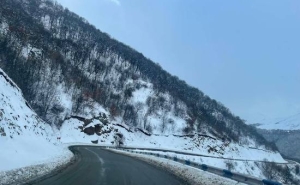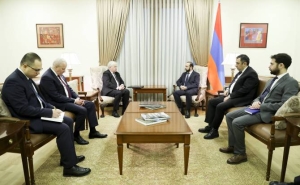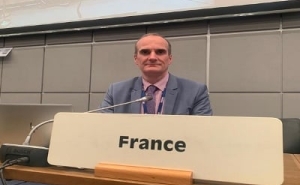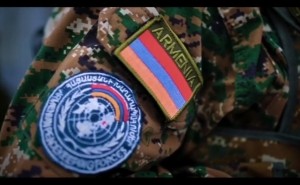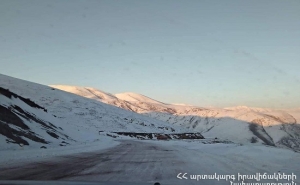Free Democrats Party and Its Foreign Policy Priorities: Interview With Stepan Safaryan (EXCLUSIVE)
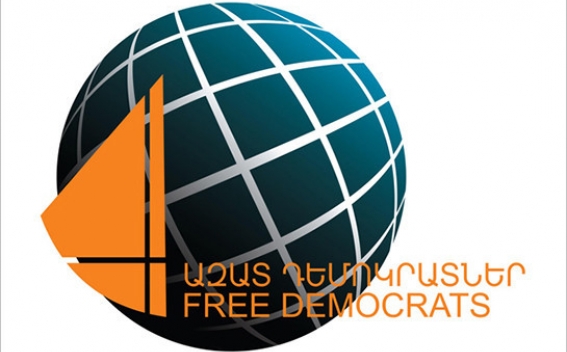
Parliamentary elections are also a choice of the foreign policy course of the country. One of the priorities of "Armedia" IAA is the coverage and analysis of the foreign policy of the Republic of Armenia. On the eve of parliamentary elections scheduled for April 2, "Armedia" IAA conducts interviews with the representatives of all nine political forces giving them the same questions, which will allow our readers to better understand the approaches of the political forces regarding the foreign policy priorities of Armenia.
"Armedia’’ IAA presents an exclusive interview with the member of the "Free Democrats" party, Stepan Safaryan.
-Will you, please, name the three main priorities of the foreign policy directions of your political power?
- First, European integration and European Armenia; second, diversification of security in a broad sense , not only in foreign policy, but also in reforming economic and energy policies; third, the return of the sovereignty of Armenia, the withdrawal of the RA from the EAEU.
- What is your position on Karabakh conflict settlement process?
- Firstly, we believe that the self-determination of Artsakh is an established fact, and Artsakh corresponds to all the parameters necessary for the state. Recognition of Artsakh should not depend on the will of Azerbaijan, as it was laid down in the negotiation process in the recent decades, but should be conditioned solely by objective realities, such as international criteria. If something corresponds to statehood, then there is no need for Aliyev to recognize it. There are many things Aliyev cannot acknowledge, but this does not mean that something will change from his non-recognition.
Second, the international recognition of Artsakh is a real process, and not just words, as the current authorities do.
And, finally, the third: the competitiveness of Armenia and Artsakh in all senses: not only in military, military-industrial, but also in political and economic senses, and we do have that potential. I will not go deeper into separate sub-spheres, they presuppose a policy of deterring Azerbaijan, a very serious revision of the Armenian security system in all senses, which in fact presupposes the creation of a real security environment for Armenia.
- Do you consider it possible to restore the Armenian-Turkish relations in the near future? What is the key to progress in this direction? And what steps should be taken for the international recognition of the Armenian Genocide?
- We have never questioned the Armenian Genocide and we will not do this: the relations between Armenia and Turkey, or more precisely the lifting of the blockade of Armenia by Turkey, should be carried out unilaterally, since the blockade was one-sided, and, finally, the most important thing, it should be done without any preconditions.
- What is your approach towards Armenia’s integration processes? How do you see the development of Armenia's bilateral relations with the US, the Russian Federation and with individual European countries?
- Armenia and Armenian society objectively belong to the European civilizational family, like many, many post-Soviet states, including the Russian Federation. And in the context of what has been said, whatever deviations there will be, our civilizational course and direction is still leading to Europe.
However, this does not mean a breakup with the rest. In terms of our security, an important role play the Armenian-American and Armenian-Russian relations. Armenian-Russian relations need to be saved from falling into the abyss, as they led to ignoring the interests of the RA. Perhaps we are witnessing this bitter truth.
It is for this reason that the relations between the RA and RF should be equal, based on mutual support, on a high degree of attention and respect for sensitive issues.
As for the Armenian-American relations, they have a very great potential for development, since the United States is a leading country in the world, and our security cannot but be due to good relations with such a major actor.
Even if the "Free Democrats" talk about the withdrawal of the RA from the EAEA, this does not apply to the Armenian-Russian relations, since even from the security point of view, in the Armenian security system there have always been and will be bilateral Armenian-Russian relations, and not the multilateral relations, such as Armenian-Belarusian, Armenian-Kazakh, etc.
In the context of what has been said, our goal is to take into account the fact that we cannot go against the civic value bases, unite with those unions where the value bases are completely different. It makes no sense to wander and waste time. The urgent task of our statehood is building an effective, "aggressive" in a good sense, proactive state based on European values.
- How do you see the development of the relations of the RA with the neighboring countries, particularly with Iran and Georgia? What steps are needed in this direction?
- We do not have many neighbors. There are two neighbors, who play an important role for us, Georgia and Iran. Unlike others, we do not view them as a corridor to the external world. From now on they are states that play a certain role in the system of international relations, one bigger, the other one smaller. In any case, Armenia and Georgia are connected by common things and broad prospects for development, especially in the context of European identity.
As for Iran, this state is a highly reliable neighbor for us, as we are for it. However, due to the third countries, bilateral relations between the RA and Iran are hampered, or rather say, their potential has not been identified. And under these circumstances, we set ourselves to deepen this potential in practical politics as well.
- What are your political force’s views on regional security issues?
-Armenia at the moment has the task of deterring Azerbaijan, that is to break through the blockade of the Azerbaijani tandem or make it meaningless. We always thought about the breakthrough, but never about making it meaningless, since the main task of this blockade is to weaken Armenia. I'm not saying that it's easy to develop under the blockade, but we are not in full blockade and still have neighbors like Georgia and Iran. In this context, we must do our best in that direction to make this blockade fruitless and senseless. If we can do this, then they will understand that closing the borders harms only them and, consequently, this tandem will not be as dangerous for Armenia as it is today.
And since this blockade directly provides the strategy of Azerbaijan against the RA in the context of the Artsakh issue, naturally, we must understand that, despite the asymmetry of forces and resources, we can overcome all this with the help of external actors. Thus, there is an enormous field of work in the direction to make it meaningless both for blockade, and for any plan of an attack on the RA. This will be possible if we can build an aggressive, in a positive sense, flexible Armenia, which has a significant weight in the system of international relations and a self-sufficient level of own security.
- How do you see the development of the Armenia-Diaspora cooperation? What should be the priorities of the overall agenda of this relationship?
- In reality, we have one strategic ally. This is our Diaspora, our scattered Armenians all over the world. Of course, it is not homogeneous and unified. But one thing is obvious: there must be a relationship in which the interests of both sides would be reflected. We have a part of the Diaspora, which, of course, has no expectations from Armenia, but in return there is a desire to help the RA. However, such assistance is considered possible only, if there is a trust that what they give is not "eaten up" or stolen.
The second part of the Diaspora wants us to form a single agenda. Despite the fact that we have a series of problems or tasks that separate us, it is also undeniable that we have many tasks, where there is no disagreement. And in this context, at least the formation of the agenda and decisions should be made taking into account the interests of both parties, since this is a two-way movement. RA-Diaspora relations are multi-layered and have credible potential, for which we do not need to reduce the sovereignty. We do not have such requirements as others put before us. The Diaspora is a unit that puts only one requirement - to be sure that its assistance actually makes Armenia stronger. And if this task is solved, we will be able to support both the first and second parts of the Diaspora.
- What is your approach towards the processes taking place in the Middle East and the policy of Armenia towards them?
- The Middle East is a region in our immediate neighborhood, and, firstly, we must not underestimate the global threat of terrorism. I regret that our authorities at one time ignored all kinds of exhortations and paid no attention to the problems of the Iranian Armenians, and after that, those of Syrian Armenians.
We, in fact, lose our communities, and if today we still have some oases in the Middle East, then, first of all, we must think about preserving and developing normal relations with these countries in order to more quickly solve the problems of our compatriots. In many cases, we must also be demanding in matters of their security, acting not as a guarantor, but as an interested party.
Finally, we must understand that these relations directly affect regional security, since the countries involved in the region are countries of special importance to us. The interests of the US, RF, European countries, as well as bilateral relations in this region and beyond it, are also directly projected to our region.
It is for this reason that we must be attentive to the Middle East, at least, given the arguments I have presented.
Other materials on this subject
- RA President: Armenia Has No Longer Individual-Centered Government Our people witnessed the advantage of it, after the election, when for the first time in the history people did not gather and say they would make a revolution.
- The New Parliament Will Carry Out Multi-Vector and Balanced Foreign Policy In regard with Karabakh conflict, the new Parliament will have a joint approach – to resolve the conflict through peaceful negotiations. Nevertheless, in the approaches of the 4 political forces there...
- Post-Election Armenia: Changes Are Recorded in the Political Culture These elections were obsereved by an unprecedented number of observers, including both international observers and local ones, as well as our compatriots from Diaspora. This means that more representatives...
- Only 1.65% of the Armenian Voters Expressed Themselves in Favor of Great Concessions on Karabakh Issue It should be mentioned that the least votes received the approach adopted by "Congress-PPA" party, which supposed great concessions. Instead, the voters supported the settlement of the conflict with negotiations...
- What Relations with the Diaspora Did the RA Citizens Choose? Armenian Revolutionary Federation, which received 103,48 votes, thinks that the Armenian Diaspora should be fully integrated in the development of Armenian statehood.
-
 17:08
17:08The regular session of the Anti-corruption Policy Council takes place in Jermuk
-
 15:05
15:05The Prime Minister sends congratulatory messages to the supreme leader of Iran and the President of Iran
-
 11:11
11:11Armenia sends earthquake aid to Turkey
-
 10:43
10:43Commemoration of the Pontiff St. Sahak Partev
-
 09:16
09:16Some roads are closed and difficult to pass in Armenia
-
 19:55
19:55Phone conversation of the Foreign Minister of Armenia with the U.S. Assistant Secretary of State for European and Eurasian Affairs
-
 18:30
18:30Prime Minister Pashinyan and President Khachaturyan meet
-
 18:20
18:20Ararat Mirzoyan with Co-Chairman of the OSCE Minsk Group of France Brice Roquefeuil
-
 17:01
17:01Humans could land on Mars within 10 years, Musk predicts
-
 16:45
16:45France, US urge 'immediate' end to Nagorno Karabakh blockade
-
 16:01
16:01Blockaded Nagorno Karabakh launches fundraiser to support quake-hit Syria
-
 15:59
15:59Earthquake death toll in Turkey rises to 18,342
-
 15:43
15:43Ararat Mirzoyan Held a Telephone Conversation with Sergey Lavrov
-
 15:06
15:06French president rules out fighter jet supplies to Ukraine in near future
-
 14:47
14:475 Day Weather Forecast in Armenia
-
 14:44
14:44President Vahagn Khachaturyan wrote a note in the book of condolences opened in the Embassy of Syria in Armenia
-
 14:20
14:20Azerbaijan’s provocations impede establishment of peace and stability – Armenian FM tells Russian Co-Chair of OSCE MG
-
 12:57
12:57France representation to OSCE: Paris calls on Azerbaijan to restore freedom of movement through Lachin corridor
-
 11:40
11:40Command of Kosovo forces highly appreciated preparation of Armenian peacekeepers
-
 10:16
10:16The United States withdrew from sanctions against Syria for six months the provision of assistance after the earthquake
day
week
month
Humidity: %
Wind: km/h


